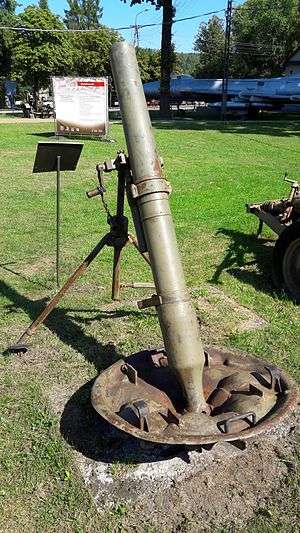107mm M1938 mortar
The Soviet 107mm M1938 mortar was a scaled-down version of the 120mm M1938 mortar intended for use by mountain troops and light enough to be towed by animals on a trolley.[2]
| 107mm mortar M1938 | |
|---|---|
 107mm mortar M1938 in White Eagle Museum | |
| Type | Mortar |
| Place of origin | Soviet Union |
| Service history | |
| In service | 1938 |
| Wars | World War II Korean War[1] Vietnam War Afghan Wars 2011 Libyan civil war |
| Production history | |
| Designed | 1936 |
| Specifications | |
| Mass | combat: 170 kg (370 lb) |
| Barrel length | 1.67 m (5 ft 6 in) |
| Diameter | 107mm |
| Crew | 5 |
| Shell | 9.1 kg (20 lb) bomb |
| Caliber | 107 mm (4.2 in) |
| Breech | muzzle loaded |
| Elevation | 45° to 80° |
| Traverse | 3° |
| Rate of fire | 15 rpm |
| Muzzle velocity | 302 m/s (990 ft/s) |
| Effective firing range | 6.3 km (3.9 mi) |
| Filling | TNT |
| Filling weight | 1.0 kg (2 lb 3 oz) (OF-841A) |
History
In World War II, the 107mm mortar saw service with Soviet mountain infantry as a divisional artillery weapon.[3] Weapons captured by the Germans were given the designation 10.7 cm Gebirgsgranatwerfer 328(r).[4] Its last significant use in battle was in the Vietnam War. The ability to break down the weapon made it particularly suited to the rugged terrain of Vietnam.[5]
The mortar fired a lighter high explosive round (OF-841) and a heavier HE round (OF-841A). The lighter HE round actually carried a larger bursting charge than the heavier round.[6] Both rounds used GVMZ-series point detonation fuzes.
Recently, the weapon has been seen in use by rebel forces during the 2011 Libyan civil war.[7]
Users
and many others
See also
Weapons of comparable role, performance and era
- Ordnance ML 4.2 inch Mortar - British equivalent
- M2 4.2 inch mortar - US equivalent
Notes
- Rottman, Gordon L. (December 2002). Korean War Order of Battle: United States, United Nations, and Communist Ground, Naval, and Air Forces, 1950-1953. Praeger. p. 198. ISBN 978-0-275-97835-8.
- Ian Hogg (ed.), Jane's Infantry Weapons 1984-85, p. 636, London: Jane's Publishing Company Ltd., 1984
- Steven Zaloga and Leland Ness, Red Army Handbook 1939-1945, p. 47, Phoenix Mill: Sutton, 1998
- Chamberlain, Peter (1975). Mortars and rockets. Gander, Terry. New York: Arco Pub. Co. p. 31. ISBN 0668038179. OCLC 2067459.
- skysoldier17.com
- Defense Intelligence Agency, Projectile Fragment Identification Guide, pp. 201-202, Washington: GPO, 1973
- https://www.youtube.com/watch?v=nwdqzTlXvl8
- Bhatia, Michael Vinai; Sedra, Mark (May 2008). Small Arms Survey (ed.). Afghanistan, Arms and Conflict: Armed Groups, Disarmament and Security in a Post-War Society. Routledge. p. 66. ISBN 978-0-415-45308-0.CS1 maint: ref=harv (link)
- Gander, Terry J. (4 June 2001). "107 mm M-38 mortar". Jane's Infantry Weapons 2002-2003. pp. 3685–3686.
- Gander, Terry J. (22 November 2000). "National inventories, Laos". Jane's Infantry Weapons 2001-2002. p. 3085.
- Small Arms Survey (2012). "Blue Skies and Dark Clouds: Kazakhstan and Small Arms". Small Arms Survey 2012: Moving Targets. Cambridge University Press. p. 131. ISBN 978-0-521-19714-4. Archived from the original (PDF) on 2018-08-31. Retrieved 2018-08-30.